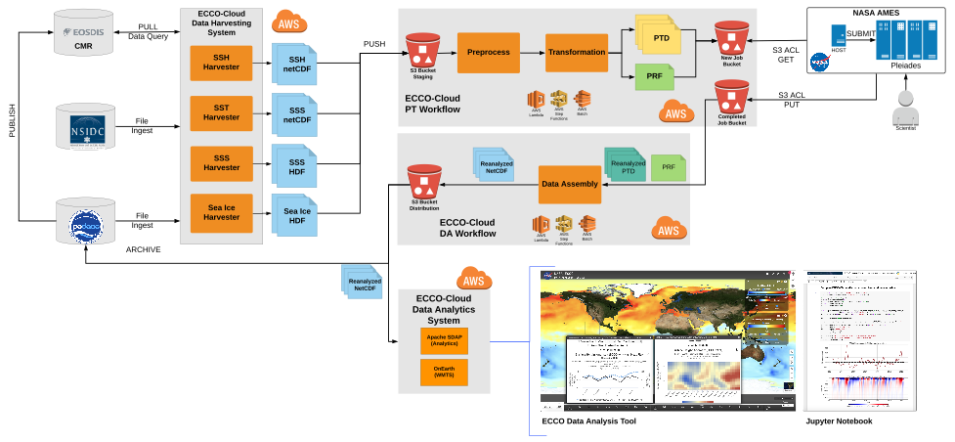The ECCO-Cloud project improves the quality of current and future ECCO products by bridging the elastic cloud and NASA's HPC environments. The project formalizes ECCO packaging according to CF standards for the global climate community, and streamlines the delivery to PO.DAAC to enable rapid access to the latest ECCO products by the research and informatic communities. ECCO-Cloud also provides a production-quality, cloud-based visualization and analysis platform and tool for data exploration and collaboration.
This work leveraged 1) the latest ECCO ocean global state estimate, 2) new software tools developed to display, analyze, extract, subset, reproject, and download ocean physical parameters from the ECCO state estimate (e.g., temperature, salinity, currents, atmosphere-ocean heat fluxes, and sea level), 3) experience in hosting and rapidly accessing the tens of gigabytes of binary output files that comprise the complete ECCO state estimate, and 4) recent developments allowing new simulations based on ECCO’s Oceanic General Circulation Model (OGCM) to be run on the Amazon Elastic Compute Cloud (Amazon EC2).
Project Status
The project has completed its two years of development, and the ECCO Data Analysis Tool (DAT) is now part of the official ECCO Group website (https://ecco-group.org). All software developed through this project is available through open source. The project also generated many supporting documents that are hosted on the Earthdata Code Collaborative (ECC).
Publications and Presentations (listed alphabetically)
Fenty, I. (2020) “ECCO Town Hall.” American Geophysical Union (AGU) Ocean Sciences Meeting, San Diego, CA. 20 February 2020.
—. (2020). “ECCO Town Hall.” AGU Fall Meeting (virtual). 3 December 2020.
—. (2019). “ECCO Town Hall.” AGU Fall Meeting, San Francisco, CA. 9 December 2019.
Fenty, I. & Heimbach, P. (2018). “ECCO Town Hall.” AGU Fall Meeting, Washington, D.C. 10 December 2018.
Ford, E. & Huang, T. (2019). “Analytics Center Framework for Estimating the Circulation and Climate of the Ocean,” NASA ESDIS System Engineering Technical Interchange Meeting. NASA’s Goddard Space Flight Center, Greenbelt, MD. July 2019.
Greguska, F., Wilson, B. & Huang, T. (2019). “Apache Science Data Analytics Platform (SDAP).” ApacheCon North America, Las Vegas. 9 September 2019.
Huang, T. (2020). “From NASA Innovation to Professional Open Source – Apache Science Data Analytics Platform (SDAP).” Earth Science Information Partners (ESIP) Winter Meeting, Bethesda, MD. 7 to 9 January 2020.
—. (2020). “Autonomously Sustainable Solution for Big Ocean Science.” Ocean Sciences, San Diego, CA. 20 February 2020.
—. (2019). “Advancing Technology for Big Ocean Science through Partnership and Open Source.” 99th American Meteorological Society (AMS) Annual Meeting, Phoenix, AZ. 8 January 2019.
—. (2019). “Overview of JPL Data Science for Earth Science.” Keynote Talk of ESA Big Data from Space (BiDS’19), Munich, Germany. February 2019.
—. (2019). “Apache Science Data Analytics Platform (SDAP).” European General Assembly, Vienna, Austria. 7 to 12 April 2019. Geophysical Research Abstracts, Vol. 21, EGU2019-18602.
—. (2019). “From Data to Insights: Shift Toward Data Analytics.” 2019 Collaborative Conference on Computation & Data Intensive Science, Canberra, Australia. 6 to 10 May 2019.
—. (2019). “Apache SDAP – A Disruptive Technology Solution for Earth Science.” 2019 Earth Science Technology Forum. NASA’s Ames Research Center, Silicon Valley, CA. 12 June 2019. Invited speaker.
—. (2019). “Open Source Data-Intensive Platform for the Cloud.” ESIP Summer Meeting, Tacoma, WA. July 2019.
—. (2019). “From Data to Insights: Shift Toward Data Analytics.” 2019 Data Analytics for Canadian Climate Services (DACCS), Montreal, Quebec, Canada. September 2019.
—. (2019). “Advancing Technology Through Open Source.” OceanObs 2019, Honolulu, HI. 15 to 20 September 2019. Invited talk and panelist.
—. (2019). “Analysis Ready Storage using Apache SDAP.” CEOS 48th Meeting of the Working Group on Information Systems & Services (WGISS-48). Hanoi, Vietnam. October 2019. Invited remote talk.
—. (2019). “Advancing Data Science Technology Through Open Source.” National Academy of Sciences 2nd Meeting of the Committee on Advancing Commercialization from Federal Labs. Washington, D.C. December 2019.
—. (2019). “Aiming for Autonomously and Sustainable Solution for Spatiotemporal Analysis.” AGU Fall Meeting, San Francisco, CA. 9 December 2019.
—. (2018). “Lessons Learned in Creating Science Data Analysis Solutions for the Cloud.” AGU Fall Meeting, Washington, D.C. 10 to 14 December 2018.
Huang, T., Fenty, I. & Heimbach, P. (2019). “Analytics Center Framework for Estimating the Circulation and Climate of the Ocean.” 2019 International Geoscience and Remote Sensing Society (IGARSS), Yokohama, Japan. 1 August 2019. Paper 3899.
Yam, E., et al. (2019). “A Cloud Environment for Automated Processing and Data-Analysis of ECCO Ocean and Ice State Estimates.” NASA Earth Science Data System Working Groups (ESDSWG), Annapolis, MD. March 2019.
